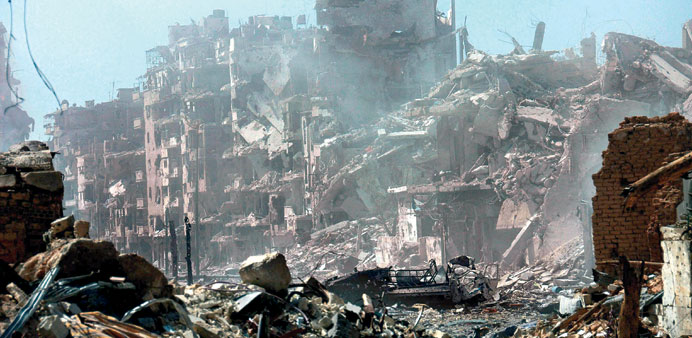|
Intense fighting in the central Syrian city of Homs has left 60 to 70% of a besieged rebel-held district damaged, destroyed or uninhabitable, a monitoring group said yesterday. |
The estimate from the Syrian Observatory for Human Rights came nine days into an all-out assault by troops loyal to President Bashar al-Assad on the rebel-held Khaldiyeh and Old City neighbourhoods, which have been under siege for more than a year.
Yesterday, new air strikes, tank shelling and rocket fire hit the city, said the Observatory.
“Sixty to 70 percent of buildings in Khaldiyeh are either totally destroyed, partially destroyed, or unsuitable for habitation,” Observatory director Rami Abdel Rahman said.
Homs is Syria’s third-largest city, and tens of thousands of its residents have fled the fighting.
“Of all Syria’s cities, Homs has suffered the highest levels of destruction... Images of Homs make it look like a world war has hit the city,” Abdel Rahman added.
Amateur video posted online by activists yesterday showed flames and thick black smoke rising from several empty burnt-out buildings already riddled with holes.
Some structures shown in the video are barely standing.
“Even if the regime takes the neighbourhoods back, there’s barely a house left standing to return to,” said Abdel Rahman.
Yesterday, government troops used mortars, rocket fire and heavy artillery to target rebel areas in the city, the Britain-based Observatory said.
“We’re under heavy pressure, especially on the Khaldiyeh front. The fighting is fierce and we are living off very scarce supplies,” said anti-regime activist Abu Khaled.
“We have run out of nearly all fuel and medical equipment after more than a year under siege,” he said via the Internet.
Regime forces have made slow progress, seizing several buildings on Khaldiyeh’s edges in recent days, “tightening the siege” on the rebels, he added.
“Homs has important symbolic value for the revolution, and if the regime takes it over, it will score a big victory,” he said.
Homs lies in central Syria, straddling supply routes to all the country’s provinces.
According to the UN, some 2,500 to 4,000 people are trapped in the besieged areas of the city.
In Damascus, regime warplanes targeted Jubar in the east of the capital, while tanks hit Qaboon in the northeast, said the Observatory.
Several mortar rounds hit Yarmuk Palestinian refugee camp in southern Damascus, it added, as rebels and troops clashed nearby.
In northern Damascus, the army tried to storm Barzeh, where rebels are still holed up, the watchdog said.
Elsewhere, a blast hit a regime post in the heart of Aleppo, Syria’s commercial capital, said the Observatory, without elaborating on casualties.
Syria’s 27-month war has killed more than 100,000 people, the group estimates.
On Saturday alone, at least 69 people were killed nationwide, it said.
The Syrian branch of the Muslim Brotherhood called yesterday for the US and Europe to deliver the rebels promised military support after the opposition’s National Coalition voted in a new president and ended a months-long leadership vacuum.
The US has signalled it is ready to send arms to the rebels, in addition to humanitarian and non-lethal military aid already in the millions of dollars.
But there have been no confirmed reports of shipments reaching Syria from its hesitant Western backers.
“We feel abandoned and disappointed that the US and Europe have backed down from their position regarding arming the Free Syrian Army and we call on the international community to fulfil its obligations,” said a statement posted by the Brotherhood on Twitter.
Melhem al-Drobi, a senior official with the Syrian Brotherhood, said there had been no official change from foreign powers in terms of promises to step up aid to the rebels.
He said the Coalition’s election on Saturday, which brought the Saudi-backed tribal leader Ahmed al-Jarba to the helm, should give the West the confidence now to send promised aid.
“We hope the international community will act seriously as it had promised,” Drobi said by telephone from the conference in Istanbul.

